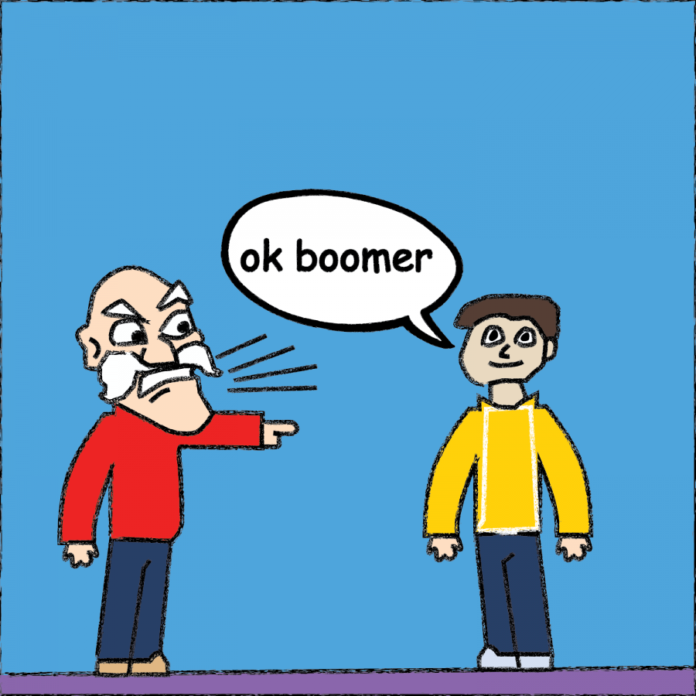Facebook millennials (and other generations) have taken to dismissively handling anyone of the Baby Boomer generation with a derisive term ‘OK, Boomer’, as if that explains all shortcomings of people of that age. As a conversation ender, ‘Boomer’ is shorthand for “you have no idea what you’re talking about, technologically, culturally, and socially inept old person that you are. Begone!” As if we are the children and they are just naturally superior in virtually all topics. This author is a ‘boomer’, so from here on in, I’ll just refer to us as ‘we’ or ‘us’. Let’s dig.
‘Baby Boomer’ is a name assigned to the generation of children born between 1945 and 1965. Soldiers returning from the war got busy baby-making, creating the largest population boom in history (hence, ‘baby boomer’). By definition, none of that generation encountered a World War. They did, however, grow up during or near the Korean War, the Cold War, the Viet Nam War, the Cuban Missile Crisis, both wars in Iraq, plus various trouble spots world-wide, such as Afghanistan, Kuwait, and the Falkland Islands.
We are the children of the Atomic Age, where nuclear weapons and powerplants were created and refined, and the Information Age, when computers went from large building-sized oddities to hand-held miracles with wireless, cell, and Internet capabilities, owned by nearly everyone of any age. Technology in nearly every facet of life has advanced exponentially during the Boomer years. Consider: at the end of WWII, there was not a single aircraft that could fly from Los Angeles, CA to Honolulu, HI! That trip required a watercraft of one kind or another. Now, flights from Dallas to China are commonplace. To put an emphasis on new capabilities, our generation sent men to the moon and back safely and intact. During our adult years, we progressed from over-air network television broadcasts to cable TV to streaming video. We went from super 8 film video recording to VHS to DVDs to Blu-Ray. The tech changes occur faster now than ever before in history. It has been said that our combined knowledge for mankind from beginning to 1950 DOUBLED in the following 20 years, and it now doubles again every 5 years or so! Needless to say, things now are quite different than then.
Things change from one generation to the next, but the changes above highlight the dramatic changes and the speed such changes become ‘normal’ for post-WWII folks. People born in 1945 were 62 years old when Apple released its first iPhone in 2007! Just think of the differences between the current iPhones and iPhone 1, and realize it has occurred over only 14 years.
But new to this dynamic is the disdain that millennials hold for prior generations. As stated in the first paragraph, ‘Boomer’ is nearly a slur. Younger generations seem to forget that those same folks that they cast off as nearly worthless CREATED the world they now enjoy! The Boomers built each step of the tech advance, standing on the shoulders of prior generations—except Boomers recognized and appreciated the efforts and accomplishments of generations preceding them. That appreciation is severely lacking in those that use ‘boomer’ as a put-down term. Note that I realize I am painting with a very large brush, seeming to condemn entire generations. There are some ‘youngsters’ that completely break this stereotype, and respect their ‘elders’. This isn’t about them.
Perhaps the new generation has grown a bit soft, as there really hasn’t been a global conflict in their lifetimes. Viet Nam War ended in 1974, and that was really the last conflict that seemed to threaten our way of life. All other skirmishes and such have happened without a mandatory draft of young adults, so they have been fought by all-volunteer forces. This doesn’t diminish the horror of war, nor does it belittle the risk. But what it does do is distance non-participants from putting much thought in those events. After all, they only happen ‘over there’.
Perhaps our entire social fabric is coarser than ever before. Modesty has become a distinct rarity over the years, and is completely unknown to many younger folks. Overt sex and formerly hidden body parts are quite visible now on a regular basis. Vulgar language and swearing has somehow made its way into common usage. Words and phrases used on a regular basis now would’ve been the cause of several soap mouthwashes in the past. Maybe these habits just replaced ‘respect’ as the default setting? Maybe the unfiltered Internet, where children of all ages are exposed to almost all information, regardless of being age-appropriate or not, plays a role in this coarsening. Maybe the attitudes expressed in music, movies, TV, and school contribute to this loss of appreciation of others’ efforts? In any case, the trend line is disturbing. Do future children continue this momentum, to the point that they don’t appreciate or respect anyone older than them? Sociologists will have a field day with us in the future, I suppose!
Welcome!Log into your account



















